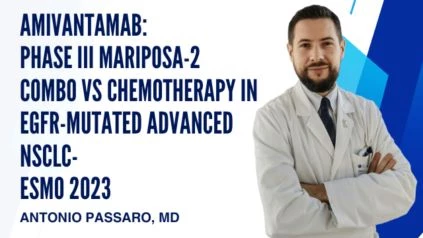By. Antonio Passaro, MD
Date. October 31, 2023
Antonio Passaro, MD, an oncologist specializing in lung cancer, has been deeply involved in the analysis and interpretation of the Phase 3 MARIPOSA-2 study. The primary objective of this pivotal trial was to investigate the efficacy and safety of the amivantamab regimen, in combination with chemotherapy, for patients with locally advanced or metastatic non-small cell lung cancer (NSCLC) harboring specific EGFR mutations.
The study’s key findings have been groundbreaking, revealing a significant advancement in the treatment landscape for NSCLC. Dr. Passaro highlights the remarkable results that demonstrate a 56% and 52% reduction in the risk of disease progression or death when utilizing amivantamab with or without lazertinib, combined with chemotherapy, in contrast to chemotherapy alone. These findings signify a substantial leap forward in managing NSCLC, particularly for patients with these specific EGFR mutations.
The implications of the MARIPOSA-2 study’s outcomes are profound. The observed improvements in objective response rate (ORR), intracranial progression-free survival (PFS), and duration of response (DOR) associated with the amivantamab regimens underscore a significant benefit for patients. Notably, the data points to enhanced outcomes for patients, particularly those suffering from brain metastases, a historically challenging aspect of NSCLC treatment.
The impact of the MARIPOSA-2 study data on intracranial activity is transformative. The demonstrated efficacy of amivantamab in combination regimens offers a promising shift in the management of NSCLC, especially for patients with brain metastases. The ability of these regimens to address intracranial disease represents a critical advancement in the field of oncology.
Regarding safety, Dr. Passaro elucidates on the adverse events associated with amivantamab in combination with chemotherapy. While some hematologic adverse events, infusion-related reactions, and serious adverse events were observed, they were notably different from those seen with chemotherapy alone. Dr. Passaro stresses the importance of considering the overall risk-benefit profile and notes that the safety profile of the amivantamab regimen is manageable, with appropriate monitoring and intervention strategies in place.
Dr. Passaro’s insights into the MARIPOSA-2 study outcomes underscore the remarkable progress in treating NSCLC, offering a more effective and tolerable therapeutic option for patients with specific EGFR mutations and brain metastases.

